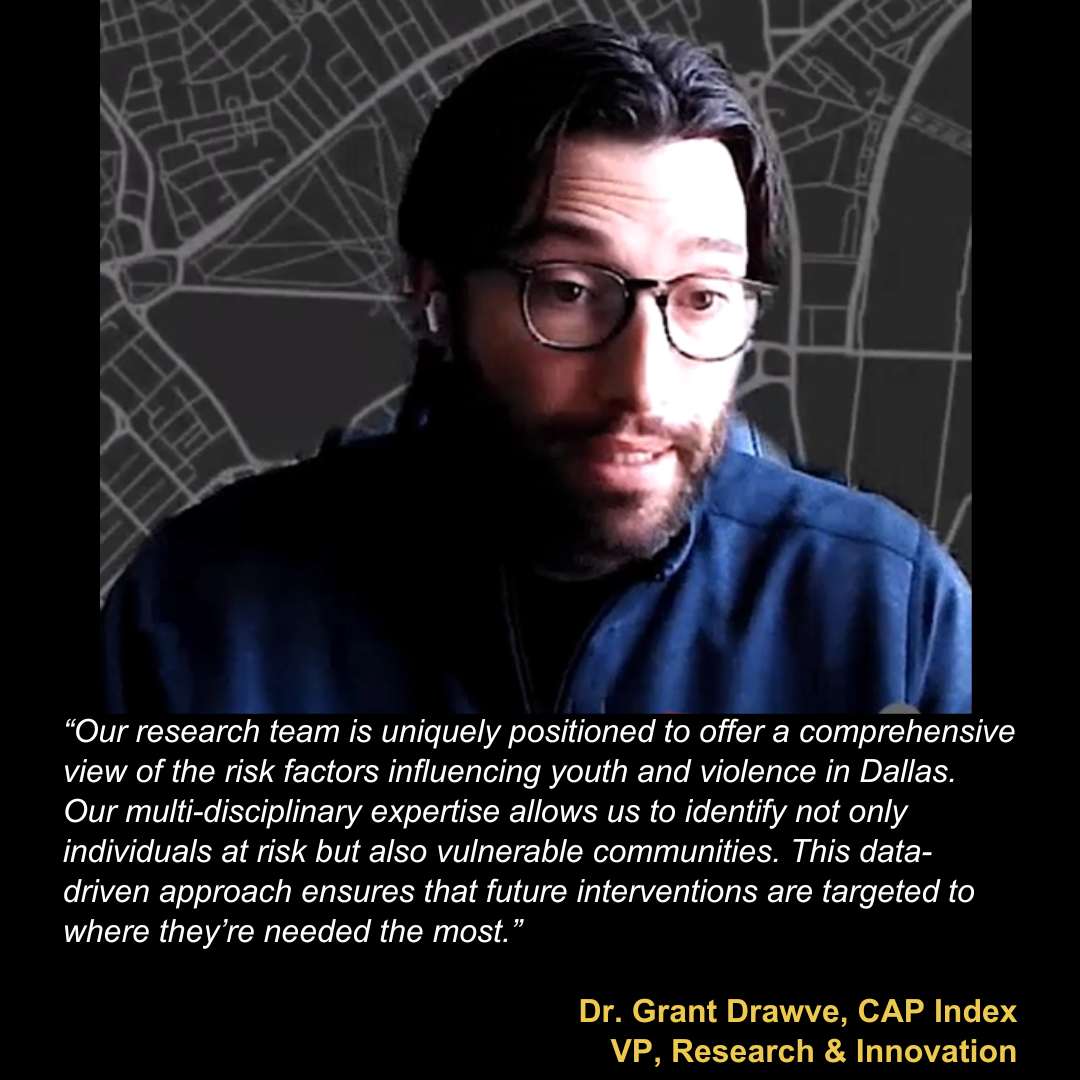Data-Driven Research to Examine Impact of Violence on Dallas Youth
CAP Index and University of Arkansas to Measure the Impact of Violence on Children in Dallas in Partnership with the Child Poverty Action Lab
Data-Driven, Place-Based Research to Provide a Holistic Understanding of Youth Violence in Dallas
CAP Index and the University of Arkansas are partnering with the Child Poverty Action Lab (CPAL), a Dallas-based nonprofit, to analyze crime trends and conduct targeted firearm research within Dallas. By moving beyond conventional crime statistics, the research will explore how exposure to violence influences mental health, academic performance, and overall well-being, highlighting the crucial impact of place on these outcomes.
Instead of relying exclusively on police crime incident data, which often reflects only a portion of criminal activity, this project will incorporate additional data sources and diverse perspectives. By utilizing a data triangulation approach, the initiative aims to capture a more comprehensive understanding of local violence that goes beyond the traditional policing lens. Recognizing that not all crimes are reported to law enforcement, this collaboration seeks to fill those gaps and provide a more complete picture of violence in Dallas.
CAP Index’s Research and Innovation team will lead the initiative, with the University of Arkansas providing additional support and offering students valuable opportunities to engage in hands-on research. This partnership harnesses the power of academia and business to generate findings that are immediately actionable, ensuring that both research and practice work together to drive meaningful change.
“CPAL understands the importance of objective research and analysis in driving impactful initiatives. As they say, better data lead to better decisions, and better decisions lead to better outcomes,” said Dr. Grant Drawve, Vice President of the Research and Innovation Team at CAP Index. “Through our collaboration with CPAL and the University of Arkansas, our research team is uniquely positioned to offer a comprehensive view of the risk factors influencing youth and violence in Dallas. The team’s multidisciplinary expertise allows us to identify not only individuals at risk but also vulnerable communities and places. This data-driven approach ensures that future interventions are strategically targeted to areas and residents that need them most.”
The research will explore various perspectives on violence, including assessments of individuals’ exposure to violence through surveys and insights from families on perceptions of safety. Beyond traditional sources like police reports, the study will incorporate data from public health, housing, education, and other sectors to provide a more comprehensive understanding of the issue.

Dr. Michael Nino, Associate Professor in the Department of Sociology and Criminology at the University of Arkansas, added, “This project represents a critical opportunity to understand violence through a broader, interdisciplinary lens. By incorporating insights from sociology, criminology, and other fields, we can better capture the complex social factors driving violence and, in turn, offer more informed solutions. Working with CPAL and CAP Index allows us to translate academic research into practical interventions that can make a real difference in Dallas communities.”
Children are often the most vulnerable to the lasting impacts of violence, which can ripple through families and communities. By leveraging our data and place-based analysis, we can uncover how location influences crime and its effect on youth, providing critical insights that can help create safer environments in cities across the country.
Exemplifying the team’s commitment to understanding the challenges posed by violence, Dr. Casey Harris, CAP Index’s Director of Research and Innovation, said, “Children are often the most vulnerable to the lasting impacts of violence, which can ripple through families and communities. By leveraging our data and place-based analysis, we can uncover how location influences crime and its effect on youth, providing critical insights that can help create safer environments in cities across the country.”
CAP Index and the University of Arkansas will leverage CPAL’s extensive data resources to complement the research team’s expertise, gaining unprecedented access to address critical knowledge gaps. This collaboration will foster a more comprehensive and nuanced understanding of the issue, guiding evidence-based interventions across the city. The findings will serve as a roadmap for city officials, place-based organizations, community stakeholders, and leaders, providing the insights needed to reduce violence and mitigate its long-term effects on Dallas’ children.
 Sample CRIMECAST Reports
Sample CRIMECAST Reports